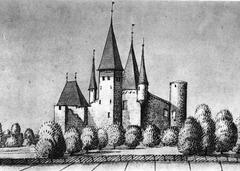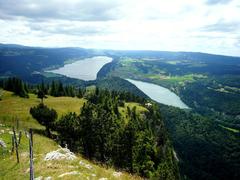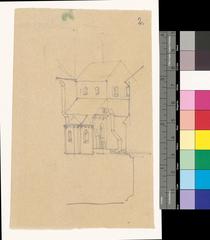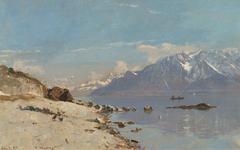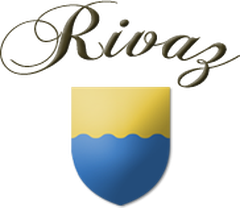Ferlens, Canton Vaud, Switzerland: Visiting Hours, Tickets, and Historical Sites Guide
Date: 04/07/2025
Introduction: Ferlens and What Visitors Can Expect
Ferlens, nestled on the Jorat plateau in the heart of the picturesque canton of Vaud, Switzerland, offers a harmonious blend of tranquil rural charm, deep historical roots, and convenient access to some of the region’s most celebrated cultural and natural landmarks. Although a small village, Ferlens is steeped in history, with evidence of settlement dating back to the early Middle Ages and medieval records highlighting its former inclusion in the seigneurie of Oron. Today, Ferlens is part of the municipality of Jorat-Mézières and embodies the essence of Swiss rural life. Its proximity to attractions such as the terraced Lavaux vineyards, Lake Geneva, Château Saint-Maire in Lausanne, and the UNESCO World Heritage-listed Lavaux adds to its appeal (Jorat-Mézières Official Website, Vaud Tourism, Lavaux UNESCO World Heritage Site).
Visitors are welcomed by Ferlens’s open, walkable environment, lush agricultural landscapes, and vibrant local traditions reflecting Vaud’s broader cultural identity. The rolling hills and forests of the Jorat plateau offer exceptional opportunities for hiking, cycling, and photography—especially in summer when festivals and wine events animate the village. With convenient bus connections from Lausanne and Palézieux, Ferlens serves as a peaceful yet strategic base for exploring the Lake Geneva region’s medieval castles, museums, and lively urban centers.
This guide provides practical information on visiting hours, ticketing for nearby attractions, transportation, accommodation, and insider tips to ensure a memorable experience. Whether you are passionate about history, eager to explore Vaud’s archaeological heritage, drawn to the vineyards, or seeking authentic village life, Ferlens delivers a rewarding Swiss experience. For the latest updates and interactive resources, the Audiala mobile app offers tailored audio guides and maps for Ferlens and the wider Vaud region (Audiala app).
Table of Contents
- Introduction
- Historical Highlights of Ferlens
- Visiting Ferlens: Practical Information
- Exploring the Geography and Natural Beauty
- Climate and Best Time to Visit
- Travel Tips for Visitors
- Ferlens in the Context of Vaud’s Cultural and Regional Identity
- Transportation, Accommodation, and Travel Tips
- Frequently Asked Questions (FAQs)
- Conclusion
Historical Highlights of Ferlens
Early Settlement and Archaeological Significance
Ferlens’s heritage traces back to the early Middle Ages. Archaeological discoveries, including a necropolis from the 8th and 9th centuries, uncovered in 1825 and 1957, underscore the area’s longstanding human presence. These finds predate the earliest written references to Ferlens and highlight its significance within Vaud’s historical landscape.
Medieval Period and Feudal Ties
The earliest documented references to Ferlens (1147–1150) place it within the seigneurie of Oron, under ecclesiastical and feudal authority, notably linked to Hautcrêt Abbey and the abbot of Saint-Maurice. Over centuries, Ferlens transitioned through various administrations, including the Bernese bailiwicks of Moudon and Oron, before the modern Swiss canton system took shape.
Modern Administrative Evolution
With the creation of the Canton of Vaud in 1803, Ferlens became part of the district of Oron, later joining Lavaux-Oron in 2006. In 2016, Ferlens merged with Carrouge and Mézières to form the municipality of Jorat-Mézières, marking a new era in local governance.
Visiting Ferlens: Practical Information
Visiting Hours and Tickets
Ferlens is an open, residential village with no ticketed attractions or entrance fees. Visitors can explore freely year-round. However, ticketing and visiting hours apply to nearby attractions such as Château Saint-Maire, the Lavaux vineyards, and museums in Lausanne and the surrounding area. For guided historical tours of Ferlens or the Jorat region, advance booking is often recommended.
Getting to Ferlens
Ferlens is located approximately 14 km from Lausanne and 13 km from Saint-Saphorin on Lake Geneva. It is accessible by regional buses from Lausanne and Palézieux, and by car via local roads. Major train stations in Lausanne and Palézieux provide connections to the area, and parking is available near the village center.
Accessibility
The village offers a peaceful, pedestrian-friendly environment with well-maintained roads and paths. Public transport connects Ferlens to larger towns, and visitors with mobility considerations are advised to check the accessibility of specific routes and attractions in advance.
Exploring the Geography and Natural Beauty
Landscape and Land Use
Ferlens covers 2.2 square kilometers, with nearly 70% of the area dedicated to agriculture and 22.6% forested. The Jorat plateau’s rolling hills, meadows, and woodlands provide serene settings for hiking, cycling, and nature photography.
Nearby Attractions and Photographic Spots
Ferlens serves as an ideal base for exploring key sites in Vaud:
- Lavaux Vineyards: UNESCO-listed terraced vineyards with panoramic lake views.
- Lake Geneva: Opportunities for swimming, sailing, and lakeside relaxation.
- Château Saint-Maire (Lausanne): A notable historic castle.
- Saint-Saphorin: Picturesque lakeside village.
- Jorat Forests: Extensive hiking and wildlife observation trails.
Climate and Best Time to Visit
Ferlens experiences a temperate continental climate. Summers are warm (average highs in July: 20–25°C), making late spring through early autumn ideal for outdoor activities and festivals. Winters are cold, with occasional snowfall.
Travel Tips for Visitors
- Plan in Advance: While Ferlens itself has no entrance fees, nearby attractions may require advance ticket purchase.
- Public Transport: Regional buses efficiently connect Ferlens with Lausanne and other towns.
- Outdoor Gear: Comfortable walking shoes and weather-appropriate clothing are recommended.
- Local Events: Check the Jorat-Mézières website for seasonal festivals and markets.
Ferlens in the Context of Vaud’s Cultural and Regional Identity
Linguistic and Religious Heritage
Ferlens is situated in Romandy, the French-speaking region of Switzerland. The French language and Protestant religious traditions, introduced during the Reformation, remain integral to local identity (History of the Swiss Border).
Regional Festivities and Traditions
The Vaud region celebrates Swiss National Day (August 1st), Jeûne fédéral (September 22, 2025), and numerous local festivals featuring music, dance, and gastronomy (Swiss National Day - myswitzerland.com, Lake Geneva Region Events).
Gastronomy and Wine Culture
Vaud is Switzerland’s second-largest wine-producing canton, renowned for Chasselas wines and dishes such as papet vaudois. Wine festivals and open cellar days are highlights, particularly in Lavaux (myswitzerland.com - Wine Tourism).
Architectural and Rural Heritage
Ferlens features traditional stone farmhouses, tiled roofs, and a village church at its heart. Rural trails reveal centuries-old dry-stone walls, orchards, and vineyards, emblematic of Vaud’s agricultural legacy (myswitzerland.com - Hiking).
Community Life and Social Cohesion
Strong social ties, active village associations, and seasonal events foster a vibrant community spirit. Village fêtes and markets provide authentic opportunities for visitors to engage with local traditions.
Transportation, Accommodation, and Additional Travel Tips
Getting Around
- Public Transport: The Mobilis Vaud network offers seamless travel across trains, buses, and boats with integrated tickets (Mobilis Vaud Fare Network).
- Swiss Travel Pass: Provides unlimited travel and museum access (Swiss Travel System).
- Car Rentals: Available in Lausanne or Geneva; parking is available but limited in Ferlens.
- Cycling & Hiking: The area is well-suited for cyclists and hikers, with rental facilities in nearby towns.
Accommodation
Options range from guesthouses and apartments in Jorat-Mézières to luxury hotels in Lausanne, Montreux, and Vevey. Booking in advance is recommended during peak seasons.
Practical Advice
- Language: French is spoken locally; basic French phrases are appreciated.
- Currency: Swiss Francs are widely used; credit cards accepted in most places.
- Accessibility: Major attractions offer good accessibility; check specifics for rural sites.
- Safety: Switzerland is very safe; tap water is potable.
Top Nearby Attractions
- Chillon Castle: Open daily, tickets required. Medieval fortress with lake and mountain views.
- Lavaux Vineyards: UNESCO site, guided tours, and wine tastings available.
- Lausanne Olympic Museum: Open Tuesday–Sunday, ticketed entry.
- Lausanne Cathedral: Free entry, small fee for tower access.
- GoldenPass Railway: Scenic route, reservations recommended in summer.
- Vevey and Alimentarium: Food museum, open Tuesday–Sunday.
- Parc de Mon Repos: Historic park in Lausanne.
Frequently Asked Questions (FAQ)
Q: Are there entrance fees for Ferlens?
A: No. Ferlens is open year-round without entrance fees. Some nearby museums and castles require tickets.
Q: How do I reach Ferlens from Lausanne?
A: Take a regional train to Palézieux or Oron, then a bus or taxi to Ferlens.
Q: Is Ferlens family-friendly?
A: Yes. Its peaceful environment and outdoor spaces are ideal for families.
Q: Are guided tours available?
A: Yes. Guided tours of Ferlens and neighboring historical sites can be arranged via local tourism offices.
Q: What’s the best time to visit?
A: Late spring to early autumn (May–September), when weather is pleasant and local events are frequent.
Q: Is Ferlens wheelchair accessible?
A: The village is generally accessible, but some rural trails may be uneven. Major nearby attractions offer good accessibility.
Plan Your Visit and Stay Connected
For the latest updates on attractions, events, travel tips, and visitor resources, download the Audiala app and visit the official sites below. Explore related articles for more on Vaud’s culture, wine, and historical landmarks.
Visuals:
- Use high-quality photos of Ferlens, Lavaux vineyards, and local festivals (with descriptive alt text).
- Embed maps for orientation.
- Link to virtual tours offered by official tourism sites.
Summary & Final Tips
Ferlens is a gateway to the cultural and natural treasures of Vaud. Its open village layout, historical depth, and proximity to top attractions make it a rewarding destination for all travelers. With efficient transport links, diverse accommodation, and a vibrant events calendar, planning your visit is straightforward and enriching. For an optimal trip, check official tourism resources, book tours in advance, and make use of the Audiala app for interactive guidance (Jorat-Mézières Official Website, Vaud Tourism, Lavaux UNESCO World Heritage Site). Discover the timeless appeal of Ferlens and the Vaud region.
References and Further Reading
- Jorat-Mézières Official Website
- Vaud Tourism
- Lavaux UNESCO World Heritage Site
- Vaud Official History PDF
- Swiss National Day - myswitzerland.com
- History of the Swiss Border
- Lake Geneva Region Events
- myswitzerland.com - Wine Tourism
- myswitzerland.com - Hiking
- myswitzerland.com - About Switzerland
- Mobilis Vaud Fare Network
- Swiss Travel System
- Chillon Castle Official Website
- Lausanne Tourism - Cathedral
